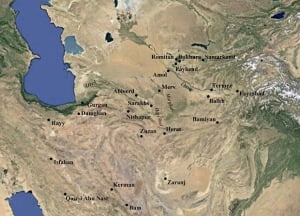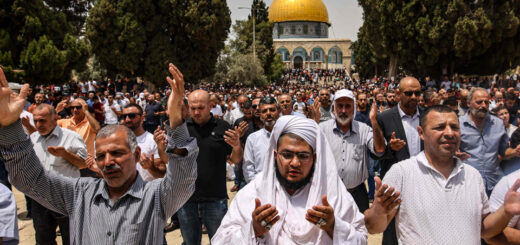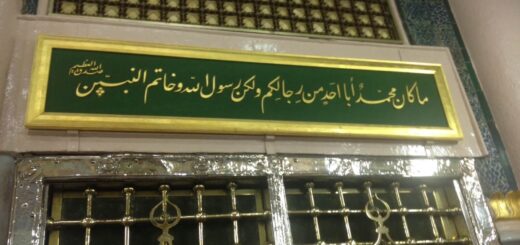March of the Black Banners

Getting your Trinity Audio player ready...
|
The traditions of the ‘black banners’ or march of the ‘black banners’ al-Riyāt al-Sawd, for some are truly evocative. In a world characterised by oppression, injustice and even outright evil, the reported wording of these traditions speaks of apocalyptic end times, giving hope to a promise of deliverance. An army setting march from the east, with mention of the region of Khurāsān, that seeks justice and depending upon the wording, being a potent force for either the coming of the Mehdi, or having him among its ranks.
These traditions are purportedly narrated upon the authority of three-companions, Thawbān, Abu Hurayrah and Abdullah ibn Mas’ud, may Allah be pleased with them all. Within the corpus of aḥādith, they sit outside of the Ṣaḥīḥ collections of Bukhāri and Muslim. Despite having a chapter dedicated to the topic of the Mehdi, they do not appear either in the Sunan of Abu Dāwud. Among the well-known collections of aḥādith, they are to be found in the Sunan of Ibn Mājah and one narration in the Sunan of al-Tirmidhi. The remainder, rest within the wider corpus.
Hadith of Thawbān
Among the well-known books of ḥadith, this narration is only cited by Ibn Mājah in the book of Fitan (tribulations):
حدثنا محمد بن يحيى وأحمد بن يوسف قالا حدثنا عبد الرزاق عن سفيان الثوري عن خالد الحذاء عن أبي قلابة عن أبي أسماء الرحبي عن ثوبان قال قال رسول الله صلى الله عليه وسلم يقتتل عند كنزكم ثلاثة كلهم ابن خليفة ثم لا يصير إلى واحد منهم ثم تطلع الرايات السود من قبل المشرق فيقتلونكم قتلا لم يقتله قوم ثم ذكر شيئا لا أحفظه فقال فإذا رأيتموه فبايعوه ولو حبوا على الثلج فإنه خليفة الله المهدي
Muḥammad ibn Yaḥya and Aḥmad ibn Yusuf narrated to us they said Abdar-Razzāq narrated to us from Sufyān al-Thawri from Khālid al-Ḥudzā’ from Abu Qilābah from Abu Usāma al-Raḥbi from Thawbān, he said the Messenger of Allah peace and blessings be upon him said:
Three will fight one another for your treasure, each one of them the son of a Khaleef, but none of them will gain it. Then the black banners will come from the east, and they will kill you in an unprecedented manner. Then he mentioned something that I do not remember, then he said: When you see them, then pledge your allegiance to them even if you have to crawl over the snow, for that is the Khaleefah of Allah, al-Mehdi.
Print versions of Sunan Ibn Mājah have the sourcing for the narration as being ḍaef (weak), often mentioning that this is because of the ‘from’ reporting by Sufyān al-Thawri. Perhaps more specifically, Abdar-Razzāq is not held to be strong when he reports directly from Sufyān al-Thawri with ‘an (‘from’) without an additional link in the channel of transmission, even though both are considered trustworthy.
It also appears in other collections, notably the following:
- Mustadrak of al-Ḥākim [Vol. 4, no. 8432, 8596]
- Dalā’il al-Nabuwa, al-Bayhaqy [Vol. 7, no. 2880/2881]
- Musnad al-Bazzār [Vol. 10, no. 4163]
- Kitāb al-Fitan, by Nu’aym ibn Ḥammād [no. 896, p. 311]
- Musnad Aḥmad [Vol. 5, no. 22441]
Al-Ḥākim records one version in al-Mustadrak [no. 8432] with the isnād: Abu Abdullah al-Ṣaffār reported to us Muḥamamd ibn Ibrāhim Aruma narrated to us al-Ḥussein ibn Ḥafṣ narrated to us Sufyān narrated to us from Khālid al-Ḥudzā’ from Abu Qilābah from Abu Usāma from Thawbān, he said the Messenger of Allah peace and blessings be upon him said. Al-Ḥākim then says: ‘This ḥadith is Ṣaḥīḥ upon the conditions of the two Shaykh’s.’ Al-Bazzār in his Musnad after citing the tradition through this channel comments with: ‘And this ḥadith has been narrated in a manner other than this pathway with this wording. And we don’t know of this wording except by way of this ḥadith. If more meanings of this ḥadith have been narrated, then we chose this ḥadith for the authenticity of its men in the isnād (narrating from) Thawbān; its isnād is Ṣaḥīḥ.’
Presenting all previous analysis and commentary upon these narrations would evidently be beyond scope. It is intended though to provide a short overview. Each narration will be mentioned in turn, together with what a snapshot of what previous scholarly authorities have said. From the outset though it should be noted that scholarly disagreement exists concerning the authenticity of these narrations. Many of the established authorities have criticised the narrators who appear in the isnād (channel of transmission), quite aside from the reported text.

Region of Khurasan
With slightly shorter wording, al-Ḥākim cites the tradition elsewhere in al-Mustadrak [no. 8596], but as a statement of Thawbān:
أخبرنا الحسين بن يعقوب بن يوسف العدل ثنا يحيى بن أبي طالب ثنا عبد الوهاب بن عطاء أنبأ خالد الحذاء عن أبي قلابة عن أبي أسماء عن ثوبان رضي الله عنه قال إذا رأيتم الرايات السود خرجت من قبل خراسان فاتوها ولو حبوا فان فيها خليفة الله المهدى
هذا حديث صحيح على شرط الشيخين ولم يخرجاه
al-Ḥussein ibn Ya’qub ibn Yusuf al-‘Adl reported to us Yaḥya ibn Abi Ṭālib narrated to us Abdul-Wahhāb ibn ‘Aṭā narrated to us Khālid al-Ḥudzā’ reports from Abu Qilābah from Abu Usāma from Thawbān, may Allah be pleased with him, he said: ‘When you see the black banners coming out from the direction of Khurāsān, then go to them even if you have to crawl, for among them is the khalifah of Allah, al-Mehdi.’
In his follow-on comment, al-Ḥākim said: ‘This ḥadith is Ṣaḥīḥ upon the conditions of the two Shaykh’s [sic. Bukhāri and Muslim] but they didn’t record it.’ Similar also appears in Kitāb al-Fitan, by Nu’aym ibn Ḥammād:
حدثنا أبو نصر الخفاف عن خالد عن أبي قلابة عن ثوبان قال إذا رأيتم الرايات السود خرجت من قبل خراسان فائتوها ولو حبوا على الثلج فإن فيها خليفة الله المهدي
Abu Naṣr al-Khafāf narrated to us from Khālid from Abu Qilābah from Thawbān, he said: When you see the black banners emerging from the direction of Khurāsān, then go to them, even crawling on the snow, for among them is the khaleefah of Allah, the Mehdi.
In the Dalā’il al-Nabuwa of Bayhaqy, there is an intersecting isnād quoted with a slight variance of the reported wording:
أخبرنا علي بن أحمد بن عبدان أخبرنا أبو القاسم الطبراني حدثنا إبراهيم بن سويد الشبامي حدثنا عبد الرزاق ح وأخبرنا أبو عبد الله الحافظ أخبرنا أبو عبد الله بن محمد بن مخلد بن أبان الجوهري ببغداد حدثنا عبد الله بن أحمد بن إبراهيم الدورقي حدثنا يعقوب بن حميد بن كاسب حدثنا عبد الرزاق أخبرنا الثوري عن خالد الحذاء عن أبي قلابة عن أبي أسماء عن ثوبان قال قال رسول الله صلى الله عليه وسلم يقتتل عند كنزكم هذه ثلاثة كلهم ولد خليفة لا تصير إلى واحد منهم ثم تقبل الرايات السود من خراسان فيقتلونكم مقتلة لم تروا مثلها ثم ذكر شيئا فإذا كان ذلك فأتوه ولو حبوا على الثلج فإنه خليفة الله
وفي رواية ابن عبدان ثم تجيء الرايات السود فيقتلونكم قتلا لم يقتله قوم ثم يجيء خليفة الله المهدي فإذا سمعتم به فأتوه فبايعوه فإنه خليفة الله المهدي
Ali ibn Ahmad ibn ‘Abdān reported to us Abul’Qāsim al-Ṭabarāni reported to us Ibrāhim ibn Suwayd al-Shabami narrated to us Abdar-Razzaq narrated to us, hawala, Abu Abdullah al-Ḥāfiz reported to us Abu Abdullah ibn Muhammad ibn Makhlad ibn Abbān al-Jawahiri reported to us in Baghdad, Abdullah ibn Ahmad ibn Ibrahim al-Douraqi narrated to us Ya’qub ibn Ḥumayd ibn Kasib narrated to us Abdar-Razzāq narrated to us al-Thawri reported to us from Khālid al-Ḥudzā’ reports from Abu Qilābah from Abu Usāma from Thawbān he said the Messenger of Allah peace be upon him said: Three will fight one another for your treasure, each one of them the son of a khaleefah, but none of them will gain it. Then the black banners will depart from Khurāsān, and they will kill you in a manner not previously seen. Then he mentioned something [then he said]: If that is the case, then go to them if you have to crawl over the snow, for that is the Khaleefah of Allah, al-Mehdi.
In the riwāyah of Ibn ‘Abbdān: Then the black banners will come and they will kill you in a way that no people have killed. Then the khaleefah of Allah, the Mehdi, will come. If you hear of him, then go to him and pledge allegiance to him, for he is the Khaleefah of Allah, the Mehdi.
Notwithstanding the assessments of al-Bazzār and al-Ḥākim, other scholars have differed over this line of reporting, namely: Khālid al-Ḥudzā’ / Abu Qilābah / Abu Usāma / Thawbān. Bayhaqy doesn’t accept this line as being strong. His follow-on comment after citing the tradition is:
وأخبرنا أبو عبد الله الحافظ أخبرنا أبو حامد أحمد بن محمد بن الحسين الخسروجردي حدثنا موسى بن عبد المؤمن حدثنا أبو جعفر محمد بن مسعود أخبرنا عبد الرزاق فذكره
بإسناده ومعناه وقال فإذا رأيتموهم فبايعوهم ولو حبوا على الثلج فإنه خليفة الله المهدي
تفرد به عبد الرزاق عن الثوري وروي من وجه آخر عن أبي قلابة وليس بالقوي
And Abu Abdullah al-Ḥāfiz reported to us Abu Ḥāmid Aḥmad ibn Muḥammad ibn al-Ḥussein al-Khasrujardi reported to us Musa ibn Abdul’Mu’min narrated to us Abu Ja’far Muhammad ibn Mas’ud narrated to us Abdar-Razzāq reported to us and he mentioned it.
By way of its isnād and its meaning, and he said, ‘If you see them, pledge allegiance to them even if should you have to crawl on the snow, for he is the Khaleefah of Allah, the Mehdi.’The tradition has been narrated by Abdar-Razzāq from al-Thawri alone. It was narrated from another pathway from Abu Qilābah and it is not strong.
In al-‘Ilal of Aḥmad ibn Ḥanbal [Vol. 2, no. 2443], Ibn ‘Ulayah is quoted, citing the weakness of this line of reporting, namely; Khālid al-Ḥudzā’ / Abu Qilābah / Abu Usāma / Thawbān; the isnād is viewed as having an underlying defect. In the Musnad, Aḥmad has the abridged narrative but with a broken channel of reporting:
حدثنا عبد الله حدثني أبي ثنا وكيع عن شريك عن على بن زيد عن أبي قلابة عن ثوبان قال قال رسول الله صلى الله عليه وسلم إذا رأيتم الرايات السود قد جاءت من قبل خراسان فائتوها فان فيها خليفة الله المهدي
تعليق شعيب الأرنؤوط: إسناده ضعيف
Abdullah narrated to us my father narrated to me Waki’ narrated to us from Shareek from Ali ibn Zayd from Abu Qilābah from Thawbān, he said the Messenger of Allah peace and blessings be upon him said: If you see the black banners that come from Khurāsān, go to them, for within them is the khaleefah of Allah, the Mehdi.
In his commentary upon the Musnad Shu’ayb al-Arnā’uṭ states that the isnād is ḍaef (weak). Bayhaqy has this channel also in Dalā’il al-Nabuwa. The isnād appears to be munqaṭi, because it is not established beyond reasonable doubt that Abu Qilābah heard directly from Thawbān, as pointed out by several authorities, including al-Dhahabi in Siyar ‘Alām al-Nubulā’ [Vol. 4, no. 678, pp. 470/471] and al-Ḥāfiz Ibn Ḥajar in Tahzeeb al-Tahzeeb [Vol. 5, no. 4388]. It can reasonably be assumed that the missing narrator after Abu Qilābah is Abu Usāma al-Raḥbi in light of the other channels; the wording is similar to the abridged narratives previously mentioned in any case.
Hadith of Abu Hurayrah
Abu Esa al-Tirmidhi has this narration in his collection of Sunan:
حدثنا قتيبة حدثنا رشدين بن سعد عن يونس عن ابن شهاب الزهري عن قبيصة بن ذؤيب عن أبي هريرة، قال قال رسول الله صلى الله عليه وسلم تخرج من خراسان رايات سود لا يردها شيء حتى تنصب بإيلياء
هذا حديث غريب
Qutayba narrated to us Rishdeen ibn Sa’d narrated to us from Yunus from Ibn Shihāb al-Zuhri from Qabeeṣa ibn Dhu’wayb from Abu Hurayrah, he said the Messenger of Allah peace and blessings be upon him said: Black banners will come from Khurāsān, nothing shall turn them back until they are planted in Iliyā.
[Abu Esa] This ḥadith is ghareeb
Designating the narration as ‘ghareeb,’ is an indication by al-Tirmidhi that it is ḍaef. It is also cited in other collections, notably the following:
- Dalā’il al-Nabuwa, al-Bayhaqy [Vol. 7, no. 2882]
- Kitāb al-Fitan, Nu’aym ibn Ḥammād [no. 583, p. 213]
- Musnad Aḥmad [Vol. 8, no. 8760]
- al-Mu’jam al-Awsat, al-Ṭabarāni [Vol. 4, no. 3536]
The reference in the matn (reported textual wording) to ‘Iliyā’ refers to Jerusalem, stemming presumably from the Roman name for the city, ‘Aelia Capitolina.’ That which is recorded in Kitāb al-Fitan of Nu’aym ibn Ḥammād gives further confirmation of the city:
حدثنا قتيبة بن سعيد حدثنا رشدين بن سعد المهري عن يونس بن يزيد الأيلي عن ابن شهاب عن قبيصة بن ذؤيب عن أبي هريرة رضي الله عنه قال قال رسول الله صلى الله عليه وسلم تخرج من خراسان رايات سود لا يردها شئ حتى تنصب بايلياء يعني بيت المقدس
Qutayba narrated to us Rishdeen ibn Sa’eed al-Mihri narrated to us from Yunus ibn Yazeed al-‘Ayli from Ibn Shihāb from Qabeeṣa ibn Dhu’wayb from Abu Hurayrah, may Allah be pleased with him, he said the Messenger of Allah peace and blessings be upon him said: Black banners will appear from Khurāsān; nothing will stop them until they are raised in Iliyā’, meaning Bayt al-Maqdis.
In the Musnad of Aḥmad the same tradition is recorded:
حدثنا عبد الله حدثني أبي حدثنا يحيى بن غيلان وقتيبة بن سعيد قالا حدثنا رشدين بن سعد قال يحيى بن غيلان في حديثه قال حدثني يونس بن يزيد عن بن شهاب عن قبيصة عن أبي هريرة عن رسول الله صلى الله عليه وسلم قال يخرج من خراسان رايات سود لا يردها شيء حتى تنصب بإيلياء
تعليق شعيب الأرنؤوط: إسناده ضعيف جدا
Abdullah narrated to us my father narrated to us Yaḥya ibn Ghaylān and Qutayba ibn Sa’eed narrated to us, they said Rishdeen ibn Sa’d narrated to us; Yaḥya ibn Ghaylān in his ḥadith said: Yunus ibn Yazeed narrated to us from Ibn Shihāb from Qabeeṣa from Abu Hurayrah from the Messenger of Allah peace and blessings be upon him, he said: Black banners will come from Khurāsān, nothing shall turn them back until they are planted in Iliyā.
In his commentary upon the Musnad Shu’ayb al-Arnā’uṭ says: ‘Its isnād is ḍaef jiddan.’ After mentioning the tradition, Bayhaqy’s comment is: ‘It was narrated singularly by Rishdeen ibn Sa’d from Yunus ibn Yazeed, narrated closely from this wording also by Ka’b al-Ahbār, perhaps it is similar, and Allah knows best.’ The singularity of reporting from Rishdeen ibn Sa’d is also noted by al-Ṭabarāni. Fatal for the narration altogether is this narrator’s presence. Rishdeen ibn Sa’d, has been heavily criticised by the previous scholarly authorities. Al-Ḥāfiz records the assessment in Tahzeeb al-Tahzeeb [Vol. 3, no. 2526], which includes the following:
- Abu Ḥātim said: ‘Munkar in ḥadith and in him, negligence. And he narrates manākeer from the thiqāt (trustworthy narrators); ḍaef in ḥadith.’
- al-Nasā’i said: ‘Matruk (discarded) in ḥadith’; elsewhere noting: ‘ḍaef in ḥadith, do not write his ḥadith.’
- Ibn Qānih’ and al-Dāraquṭni said: ‘ḍaef in ḥadith.’
Ibn Sa’d also records his status as ḍaef in ḥadith in al-Ṭabaqāt [Vol. 7, no. 6248]. Al-Dhahabi has similarly in al-I’tidal fi Naqd al-Rijāl [Vol. 2, no. 2870], noting the additional assessments of:
- Ibn Ma’een said: ‘He is nothing’
- Abu Zur’a said: ‘ḍaef’
- Al-Jawzajāni said: ‘He has many manākeer’ [sic. pl. munkar, disclaimed]
With this assessment, together with the singularity of the report, no standing proof can be established with this. Thus, it seems very difficult to contend with Shu’ayb al-Arnā’uṭ’s comment of this narration being ḍaef jiddan.
Hadith of Ibn Mas’ud
Again, among the well-known books of ḥadith, this tradition is only cited in the Sunan of Ibn Mājah in the book of Fitan. The wording is longer, with a different isnād altogether:
حدثنا عثمان بن أبي شيبة حدثنا معاوية بن هشام حدثنا علي بن صالح عن يزيد بن أبي زياد عن إبراهيم عن علقمة عن عبد الله، قال بينما نحن عند رسول الله صلى الله عليه وسلم إذ أقبل فتية من بني هاشم فلما رآهم النبي صلى الله عليه وسلم اغرورقت عيناه وتغير لونه قال فقلت ما نزال نرى في وجهك شيئا نكرهه فقال إنا أهل بيت اختار الله لنا الآخرة على الدنيا وإن أهل بيتي سيلقون بعدي بلاء وتشريدا وتطريدا حتى يأتي قوم من قبل المشرق معهم رايات سود فيسألون الخير فلا يعطونه فيقاتلون فينصرون فيعطون ما سألوا فلا يقبلونه حتى يدفعوها إلى رجل من أهل بيتي فيملؤها قسطا كما ملؤوها جورا فمن أدرك ذلك منكم فليأتهم ولو حبوا على الثلج
Uthmān ibn Abi Shayba narrated to us Mu’āwiya ibn Hishām narrated to us Ali ibn Ṣāliḥ narrated to us from Yazeed ibn Abi Ziyād from Ibrāhim from ‘Alqama from Abdullah, he said: While we were with the Messenger of Allah peace and blessings be upon him, some youngsters from Banu Hāshim came along. When the Prophet peace and blessings be upon him saw them, his eyes filled with tears and his colour changed. I said: We still see something in your face that we do not like (to see). He said: We are members of a Household for whom Allah has chosen the hereafter over this world. The people of my Household will face calamity, expulsion and exile after I am gone, until some people will come from the east carrying black banners. They will ask for something good but will not be given it. Then they will fight and will be victorious, then they will be given what they wanted, but they will not accept it and will give leadership to a man from my ahl ul bayt [people of my household]. Then they will fill it [sic. the earth] with justice just as it was filled with injustice. Whoever among you lives to see that, let him go to them even if he has to crawl over snow.’
Several collections record this tradition, among them:
- Muṣṣanaf of Ibn Abi Shayba [Vol. 14, no. 38723]
- Kitāb al-Fitan, Nu’aym ibn Ḥammād [p. 188]
- Musnad Abu Ya’la [Vol. 9, no. 5084]
- Musnad al-Bazzār [Vol. 4, no. 1491, 1566]
- Mustadrak of al-Ḥākim [Vol. 4, no. 8434]
The wording reported by Nu’aym ibn Ḥammād is as follows:
حدثنا محمد بن فضيل وعبد الله بن إدريس وجرير عن يزيد بن أبي زياد عن إبراهيم عن علقمة عن عبد الله رضي الله عنه قال بينما نحن عند رسول الله صلى الله عليه وسلم إذ جاء فتية من بني هاشم فتغير لونه فقلنا يا رسول الله ما نزل نرى في وجهك شيئا نكرهه؟ فقال إنا أهل بيت اختار الله لنا الآخرة على الدنيا وإن أهل بيتي هؤلاء سيقتلون بعدي بلاء وتطريدا وتشريدا حتى يأتي قوم من هاهنا، من نحو المشرق أصحاب رايات سود يسلون الحق فلا يعطونه مرتين أو ثلاثا فيقاتلون فينصرون فيعطون ما سألوا فلا يقبلوها حتى يدفعوها إلى رجل من أهل بيتي فيملوها عدلا كما ملوها ظلما فمن أدرك ذلك منكم فليأتهم ولو حبوا على الثلج فإنه المهدي
Muḥammad ibn Fuḍeel, Abdullah ibn Idris and Jarir narrated to us from Yazeed ibn Abi Ziyād from Ibrāhim from ‘Alqama from Abdullah, may Allah be pleased with him, he said: While we were with the Messenger of Allah peace and blessings be upon him, youth from the Hashemites came, and his color changed, so we said: O Messenger of Allah, what has been revealed to you? We saw from your face that there is something that you dislike. He said: We, the ahl ul bayt (people of the house), Allah chose the next world over this world, so the people of my house, these, will encounter trial, expulsion, and scattering after me, until a group from there, from the east, supporters of the black banners, who will ask for their due, but will not give it two or three times. They will fight, and be victorious, so then they will receive what they asked for. They will not receive it until they give it to a man from my ahl ul bayt, who will fill it with justice just as it has been filled with injustice. Whoever of you lives in that time, let him go to them, even crawling on the snow, for he is the Mehdi.
In the Musnad of Abu Ya’la, while the channel for the narration again goes through Yazeed ibn Abi Ziyād, the wording is considerably abridged:
حدثنا أبو هشام الرفاعي محمد بن يزيد ابن رفاعة حدثنا أبو بكر بن عياش حدثنا يزيد بن أبي زياد عن إبراهيم عن علقمة عن عبد الله قال قال رسول الله صلى الله عليه وسلم تجيء رايات سود من قبل المشرق وتخوض الخيل الدماء إلى ثنتها يظهرون العدل ويطلبون العدل فلا يعطونه فيظهرون فيطلب منهم العدل فلا يعطونه
قال حسين أسد: إسناده ضعيف
Abu Hisham al-Rifa’i Muḥammad ibn Yazeed ibn Rifa’a narrated to us Abu Bakr ibn ‘Ayyash narrated to us Yazeed ibn Abi Ziyād narrated to us from Ibrāhim from ‘Alqama from Abdullah, he said the Messenger of Allah peace and blessings be upon him said: Then the black banners will depart from the east, and the horses wade in blood, until they seek out justice. They demand justice, but aren’t given it; justice is asked of them, but it is not given.
In his commentary upon the Musnad, Hussein Asad said: ‘Its isnād is ḍaef.’ The narration in the Musnad al-Bazzār is to be found in two places, the latter, abridged similarly, but with a different isnād to Ibrāhim / ‘Alqama /Abdullah ibn Mas’ud:
وحدثنا الفضل بن سهل قال نا عبد الله بن داهر الرازي قال نا أبي عن بن أبي ليلى عن الحكم عن إبراهيم عن علقمة عن عبد الله أن النبي ذكر فتية من بني هاشم فاغرورقتا عيناه وذكر الرايات السود فقال فمن أدركها فليأتها ولو حبوا على الثلج
And al-Faḍl ibn Sahl narrated to us he said Abdullah ibn Dāhir al-Rāzi narrated to us he said my father narrated to us from Ibn Abi Layla from al-Ḥakam from Ibrāhim from ‘Alqama from Abdullah, that the Prophet mentioned about the young men from Bani Hashim, so much so that his eyes were swollen; and he mentioned the black banners, he said: Whoever catches that, let him go to them even if they have to crawl over snow.

Tirelessly filling the world with injustice
Bar this channel of al-Bazzār, each of the narrations is reported via Yazeed ibn Abi Ziyād, purportedly narrating from Ibrāhim al-Nakha’i from ‘Alqama from Abdullah ibn Mas’ud. Although in his follow-on comment here, al-Bazzār states of Abdullah ibn Dāhir al-Rāzi as being ‘a man from the people Ra’i, Ṣāliḥ in ḥadith,’ other scholarly authorities haven’t been as favourable. Ibn ‘Adi includes him in al-Kāmil fi Du’afā’ al-Rijāl [Vol. 4, no. 1046, p. 238] citing the narration of the black banners with the same isnād as al-Bazzār, yet with the extended wording. Ibn ‘Adi also quotes the assessment of Yaḥya ibn Ma’een that ‘he is nothing.’
Regarding the narrator Yazeed ibn Abi Ziyād, Ibn Ḥajar records in Taqreeb al-Tahzeeb [no. 7717, p. 601], that he is ḍaef, as does Ibn Ḥazm in al-Muḥalla [Vol. 6, pp 183, 192, Issue 1099]. They aren’t alone in forming that judgement. In Tahzeeb al-Tahzeeb [Vol. 11, no. 150531], al-Ḥāfiz Ibn Ḥajar notes various authorities having the same judgement, including:
- And Waki’ said: ‘Yazeed ibn Abi Ziyād (narrating) from Ibrāhim al-Nakha’i, ‘Alqama from Abdullah, the ḥadith of the (black) banners, is nothing.’
- Abu Zur’a said: ‘layyin; write his ḥadith but they are not utilised.’
- Abu Ḥātim said: ‘he is not strong.’
- al-Nasā’i said: ‘he is not strong.’
- al-Dāraquṭni said: ‘he doesn’t deviate regarding the Ṣaḥīḥ; ḍaef, he makes a lot of mistakes.’
Al-Dhahabi also directs much criticism towards this narrator, particularly too in relation to the narration at hand, noting that it is munkar. In Siyār ‘Alām al-Nubulā’, [Vol. 6, no. 2041, pp. 129/133] he records:
- Uthmān al-Dārimi narrated from Yaḥya: ‘he is not strong.’
- Abu Ya’la narrated from Yaḥya: ‘ḍaef al-ḥadith.’
- Aḥmad ibn Ḥanbal said: ‘his ḥadith concerning the (black) banners, it is nothing.’
Al-Ḥākim has the narration in the Mustadrak, with lengthier wording, via a different isnād:
أخبرني أبو بكر بن دارم الحافظ بالكوفة ثنا محمد بن عثمان بن سعيد القرشي ثنا يزيد بن محمد الثقفي ثنا حنان بن سدير عن عمرو بن قيس الملائي عن الحكم عن إبراهيم عن علقمة بن قيس وعبيدة السلماني عن عبد الله بن مسعود رضي الله عنه قال أتينا رسول الله صلى الله عليه وسلم فخرج إلينا مستبشرا يعرف السرور في وجهه فما سألناه عن شيء إلا أخبرنا به ولا سكتنا إلا ابتدأنا حتى مرت فتية من بني هاشم فيهم الحسن والحسين، فلما رآهم التزمهم وانهملت عيناه فقلنا يا رسول الله ما نزال نرى في وجهك شيئا نكرهه فقال إنا أهل بيت اختار الله لنا الآخرة على الدنيا وإنه سيلقى أهل بيتي من بعدي تطريدا وتشريدا في البلاد حتى ترتفع رايات سود من المشرق فيسألون الحق فلا يعطونه ثم يسألونه فلا يعطونه ثم يسألونه فلا يعطونه فيقاتلون فينصرون، فمن أدركه منكم أو من أعقابكم فليأت إمام أهل بيتي ولو حبواعلى الثلج، فإنها رايات هدى يدفعونها إلى رجل من أهل بيتي يواطئ اسمه اسمي، واسم أبيه اسم أبي فيملك الأرض فيملأها قسطا
Abu Bakr ibn Dārim al-Ḥāfiz reported to me in Kufa, Muḥammad ibn Uthmān ibn Sa’eed al-Qurashi narrated to us Yazeed ibn Muḥammad al-Thaqafi narrated to us Ḥanān ibn Sudeer narrated to us from ‘Amr ibn Qays al-Malā’i from al-Ḥakam from Ibrāhim from ‘Alqama ibn Qays and ‘Abida al-Salmāni from Abdullah ibn Mas’ud, may Allah be pleased with him, he said: We came to the Messenger of Allah, peace and blessings be upon him and he came out to us with glad tidings, happiness upon his face, and we did not ask him about anything except that he reported to us. And we did not remain silent except that we began until young men from Banu Hashim passed by, among them was Ḥasan and Ḥussein. When he saw them, he held them tight, and his eyes narrowed, so we said: O Messenger of Allah, we still see something in your face that we dislike. He said:
We, the ahl al-Bayt [people of the Prophetic household] Allah has chosen the Hereafter for us over this world. Verily, my ahl al-Bayt will, after me, suffer expulsions and fright in the towns, until the black flags rise from the East. So, they will demand their right, but they will not be given it. Then, they will demand it, but they will not be given it. Then, they will demand it, but they will not be given it. As a result, they will fight and will be helped to achieve victory (by Allah). Whosoever amongst you or your descendants meets it (that time), he must go to the Imām of my ahl ul-Bayt, even if he has to crawl on snow, for they are flags of guidance. They will submit them to a man from my ahl ul-Bayt. His name corresponds with my name, and the name of his father is the name of my father. He will rule the earth by kingdom, and will thereby fill it with equity and justice.
A point of note here, is that the last two sentences that appear are reported in other narrations that are related to the coming of the Mehdi, but have no mention of the black banners, such as those found in the Sunan collections al-Tirmidhi and Abu Dāwud.
Al-Ḥākim didn’t provide a follow-on comment to this. Al-Dhahabi did though in al-Talkiṣ [Vol. 7, no. 1108]: ‘I say, this is mawdu’ (fabricated).’ After noting these comments in Silsilah al-Aḥādith [Vol. 11, no. 5203], Albāni grades the narration as ḍaef, in addition to the previous one, citing the narrator Yazeed ibn Abi Ziyād. For the narration of al-Ḥākim, Albāni, with others thereafter following him, have opined that the weakness of the channel, its underlying defect, seems to stem from the narrator Ḥanān ibn Sudeer. Others have mentioned that none of the well-established narrators reporting al-Ḥakam / Ibrāhim al-Nakha’i cite the tradition with this wording despite their considerable number. Ḥanān ibn Sudeer has less than a handful of narrations. He is mentioned by Ibn Ḥibbān in al-Thiqāt [Vol. 8, no. 13091], and al-Dāraquṭni makes mention of him noting that differences have occurred upon this line of reporting in al-‘Ilal [Vol. 5, no. 808, p. 184]; he notes that he is ‘One of the scholars of the Shia.’
Other traditions
One can consult Kitāb al-Fitan by Nu’aym ibn Ḥammād to explore many of the non-Prophetic narrations that have been recorded concerning the march of the ‘black banners.’ To a lesser extent, Bayhaqy also has some in Dalā’il al-Nabuwa. Many of these narrations though, including the mursal of Sa’eed ibn al-Musayyib cited in Kitāb al-Fitan, merge the issue of the black banners with that of the rise of the Abbasid Khilāfah. In Bidāyah wal’Nihāya, Ibn Kathir seeks to point out that the Prophetic narrations of the black banners are in fact distinct from that related to the rise of the Abbasids.
Concluding remarks
As one may readily discern, this topic is complicated. Quite apart from the analysis of the narrations, the narrators and the reported textual wording, placing this within the broader context of events related to the ‘end of days,’ is indeed a difficult task. Scholarly disagreements aside though, one may find some solace in the following authentic tradition to be found in Ṣaḥīḥ Muslim, outlining that there will always be a group people from among this Ummah who will be steadfast:
حدثنا سعيد بن منصور وأبو الربيع العتكي وقتيبة بن سعيد قالوا حدثنا حماد وهو ابن زيد عن أيوب عن أبي قلابة عن أبي أسماء عن ثوبان قال قال رسول الله صلى الله عليه وسلم لا تزال طائفة من أمتي ظاهرين على الحق لا يضرهم من خذلهم حتى يأتي أمر الله وهم كذلك
Sa’eed ibn Manṣur, Abu-Rabi’a al-‘Ataki and Qutayba ibn Sa’eed narrated to us, they said Ḥammād, and he is Ibn Zayd narrated to us from Ayub from Abu Qilābah from Abu Usāma from Thawbān, he said the Messenger of Allah peace be upon him said:
A Ṭā’ifa (group of people) from my Ummah will always remain triumphant on the right path and continue to be triumphant. He who deserts them shall not be able to do them any harm. They will remain in this position until Allah’s command is executed.
The challenges this Ummah faces are immense. We ask Allah to grant us the forbearance to recognise such a Ṭā’ifa, to align with them, lending them our support. If that means to crawl over ice, then we pray to Allah to give us the strength to do so.
ياأيها الذين آمنوا من يرتد منكم عن دينه فسوف يأتي الله بقوم يحبهم ويحبونه أذلة على المؤمنين أعزة على الكافرين يجاهدون في سبيل الله ولا يخافون لومة لائم ذلك فضل الله يؤتيه من يشاء والله واسع عليم
O you who believe, if any of you go back on your faith, Allah will soon replace you with people He loves and who love Him, people who are humble towards the believers, hard on the disbelievers, and who strive in Allah’s way without fearing the blame of the blamers. Such is Allah’s favour, He grants it to whoever He will. Allah has endless bounty and knowledge
[5: 54]



